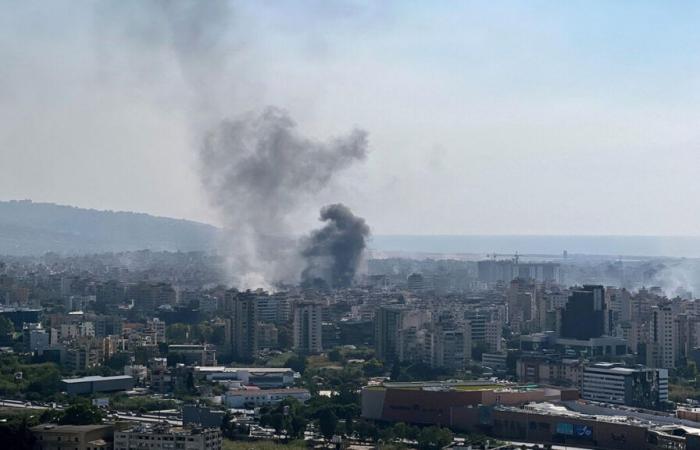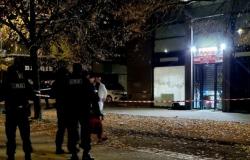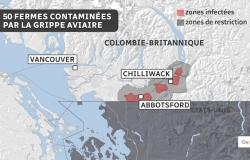A few days before the American presidential election, the visit to Jerusalem by American envoys Amos Hochstein and Brett McGurk aims to find a solution in the war between Israel and Hezbollah, the Lebanese Islamist movement. However, Israel continues its actions.
The southern suburbs of Beirut, stronghold of pro-Iranian Hezbollah, were targeted by a series of Israeli airstrikes at dawn on Friday. If the Israeli army had warned civilians asking them to evacuate certain neighborhoods, the Lebanese National Agency (ANI) reported at least 10 strikes.
According to images broadcast by AFPTV, they caused strong explosions and thick plumes of smoke then rose from the area. “The raids caused massive destruction in the targeted areas and dozens of buildings were razed,” reported ANI, also reporting the outbreak of fires.
At the same time, the Israeli army continues its intensive raids on the south and east of Lebanon. On Thursday, six rescue workers affiliated with Hezbollah and its ally Amal were killed in Israeli raids in the south of the country, according to Lebanese authorities. Bombings particularly targeted the surroundings of Tyre, in the south, and Baalbeck, in the east.
Israel's “refusal” of a ceasefire
“The extension, once again, of the aggression of the Israeli enemy against the Lebanese regions (…) and the fact that it has once again targeted the southern suburbs of Beirut with destructive raids, are as many “indicators which confirm its refusal of all efforts made to obtain a ceasefire”, reacted Lebanese Prime Minister Najib Mikati in a press release.
According to him, “the Israeli declarations and the diplomatic signals that Lebanon has received confirm Israel's obstinacy in rejecting the proposed solutions.” The President of the Lebanese Parliament, Nabih Berri, also estimated that “since September at least, Israel has missed more than one opportunity for a ceasefire”, according to his remarks reported by the National Information Agency Lebanese Ani.
The two Lebanese officials made these remarks on Friday while receiving in turn the commander of the United Nations Interim Force in Lebanon (UNIFIL), General Aroldo Lazaro.
The United States' plan
According to Israeli media citing government sources, the plan prepared by American envoys provides for a withdrawal of Hezbollah from southern Lebanon, bordering northern Israel, as well as the withdrawal of the Israeli army from this region, control of which would return to the Lebanese army and the UN peacekeepers. Lebanon would have the responsibility to prevent Hezbollah from rearming and Israel would retain its right to defend itself in accordance with international law, according to this document.
Prime Minister Benjamin Netanyahu, who received American envoys on Thursday, assured that he “appreciated” Washington's support, while refusing to give in to pressure from his ally and affirming that a truce must primarily guarantee Israel's security. “Terrorist armies will no longer be at our borders. Hamas will no longer control Gaza and Hezbollah will not establish itself on our northern border in positions allowing it to invade Israel, he said.
Israel still claims to want to neutralize Hezbollah in southern Lebanon to allow the return of some 60,000 inhabitants of the north of its territory displaced by incessant rocket fire since the start of the war in Gaza. In northern Israel on Thursday, rocket fire from Lebanon left seven people dead, according to local authorities, including four foreign agricultural workers in Metoula.
A truce in Gaza
According to Israeli media, a ceasefire still remains possible after the Israeli chief of staff, General Herzi Halevi, reported the “total dismantling of the chain of command” of Hezbollah. The new leader of Hezbollah, Naïm Qassem, on Wednesday, said he was ready for a ceasefire “under conditions”, without specifying which ones.
The visit of the American emissaries also aims, according to Washington, to obtain progress towards an end to the conflict in the Gaza Strip, where the Israeli army has mainly concentrated its offensive in the North since October 6, seven Airstrikes targeted Jabalia, Beit Lahia and Gaza City on Thursday, according to witnesses.
The war that has raged since October 7, 2023 in the Gaza Strip has spread to Lebanon, where Israel has been carrying out massive airstrikes against Hezbollah since September 23. At least 1,829 people have been killed since September 23 in Lebanon, according to an AFP count.






